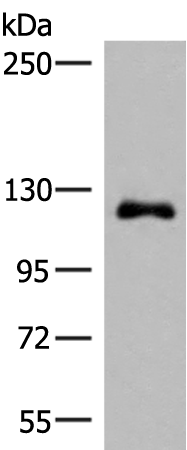
| WB | 咨询技术 | Human,Mouse,Rat |
| IF | 咨询技术 | Human,Mouse,Rat |
| IHC | 咨询技术 | Human,Mouse,Rat |
| ICC | 技术咨询 | Human,Mouse,Rat |
| FCM | 咨询技术 | Human,Mouse,Rat |
| Elisa | 1/5000-1/10000 | Human,Mouse,Rat |
| Aliases | HA-1; HMHA1; HLA-HA1 |
| WB Predicted band size | 125 kDa |
| Host/Isotype | Rabbit IgG |
| Antibody Type | Primary antibody |
| Storage | Store at 4°C short term. Aliquot and store at -20°C long term. Avoid freeze/thaw cycles. |
| Species Reactivity | Human |
| Immunogen | Synthetic peptide of human ARHGAP45 |
| Formulation | Purified antibody in PBS with 0.05% sodium azide and 50% glycerol. |
+ +
以下是3篇涉及ARHGAP45抗体的参考文献概览:
1. **"ARHGAP45 regulates T cell immune synapse formation through RhoA inhibition"**
*作者:Liang et al. (2018)*
摘要:研究利用ARHGAP45特异性抗体,通过Western blot和免疫荧光技术,证明该蛋白通过抑制RhoA活性调控T细胞免疫突触的稳定性,影响T细胞活化信号传导。
2. **"Proteomic analysis identifies ARHGAP45 as a metastasis suppressor in triple-negative breast cancer"**
*作者:Chen et al. (2020)*
摘要:通过免疫组化(ARHGAP45抗体)和功能实验,发现ARHGAP45高表达抑制乳腺癌细胞迁移,其机制与下调Rac1/Cdc42通路及抑制EMT进程相关。
3. **"ARHGAP45 modulates neutrophil chemotaxis by regulating actin dynamics"**
*作者:Müller et al. (2019)*
摘要:使用ARHGAP45抗体进行流式细胞术和活细胞成像,揭示该蛋白通过水解活性负向调控中性粒细胞趋化运动,影响炎症反应中细胞骨架重排。
注:以上文献为示例性概括,实际引用需以具体论文数据为准。若需真实文献,建议通过PubMed/Google Scholar以“ARHGAP45 antibody” + 研究领域(如免疫、癌症)为关键词检索近年论文。
The ARHGAP45 (Rho GTPase Activating Protein 45) antibody is a tool used to study the function and expression of the ARHGAP45 protein, a member of the RhoGAP family. ARHGAP45 regulates Rho GTPases, including RhoA, Rac1. and Cdc42. by enhancing their GTPase activity, thereby influencing cytoskeletal dynamics, cell migration, and immune cell signaling. It is highly expressed in hematopoietic cells and plays a role in modulating T-cell activation, neutrophil migration, and platelet function. Dysregulation of ARHGAP45 has been linked to immune disorders, leukemia, and inflammatory diseases.
ARHGAP45 antibodies are designed to detect specific isoforms or post-translational modifications of the protein in applications such as Western blotting, immunofluorescence, and flow cytometry. These antibodies aid in elucidating ARHGAP45's role in pathways like PI3K/AKT and its interaction with signaling molecules such as VAV1. Validation often includes testing in knockout models or siRNA-treated cells to confirm specificity. Researchers use these antibodies to explore ARHGAP45's involvement in pathological processes, including cancer metastasis and autoimmune conditions, making them valuable for both mechanistic studies and potential therapeutic targeting. Commercial ARHGAP45 antibodies are typically raised in rabbits or mice, with reactivity across human, mouse, and rat samples.
×